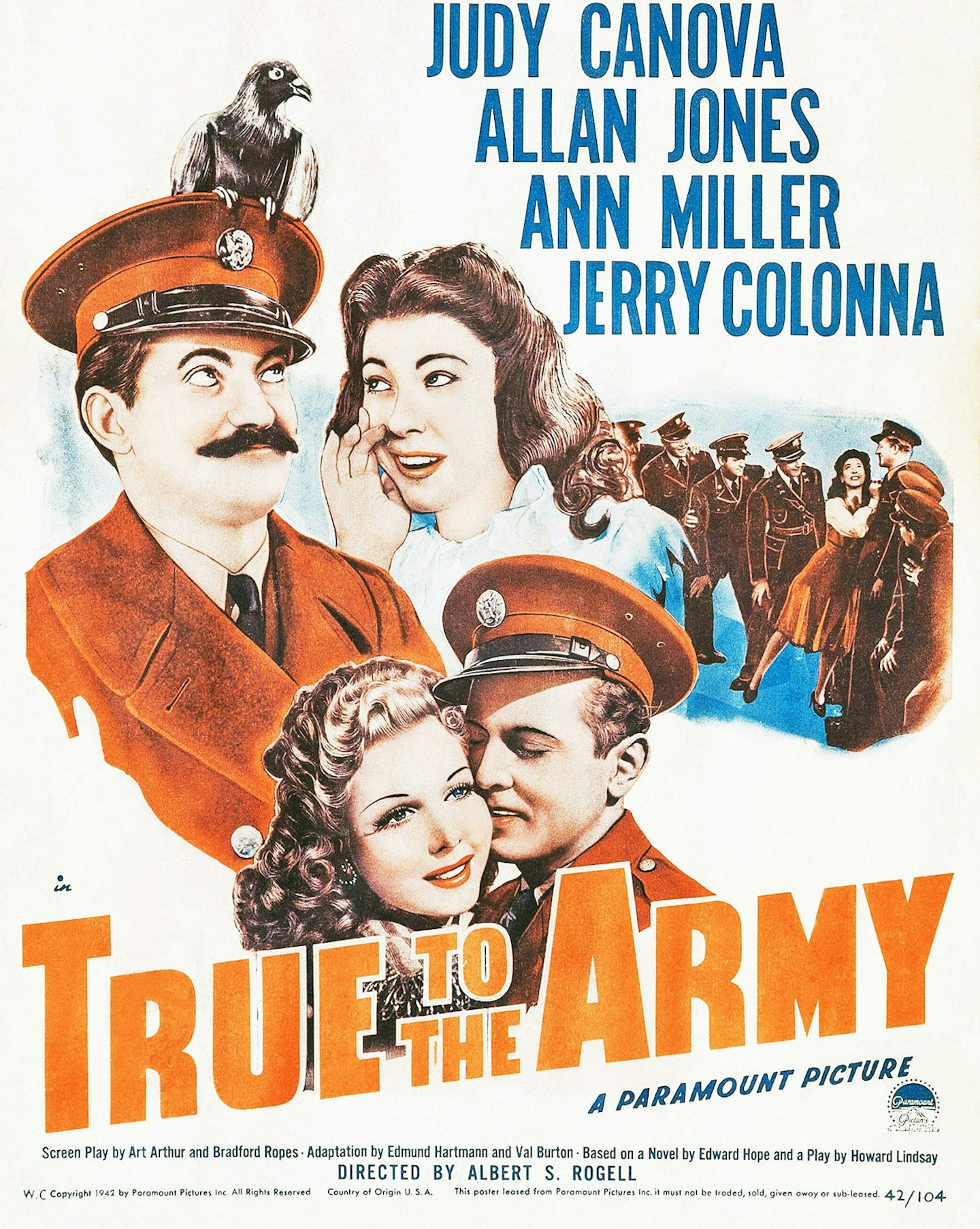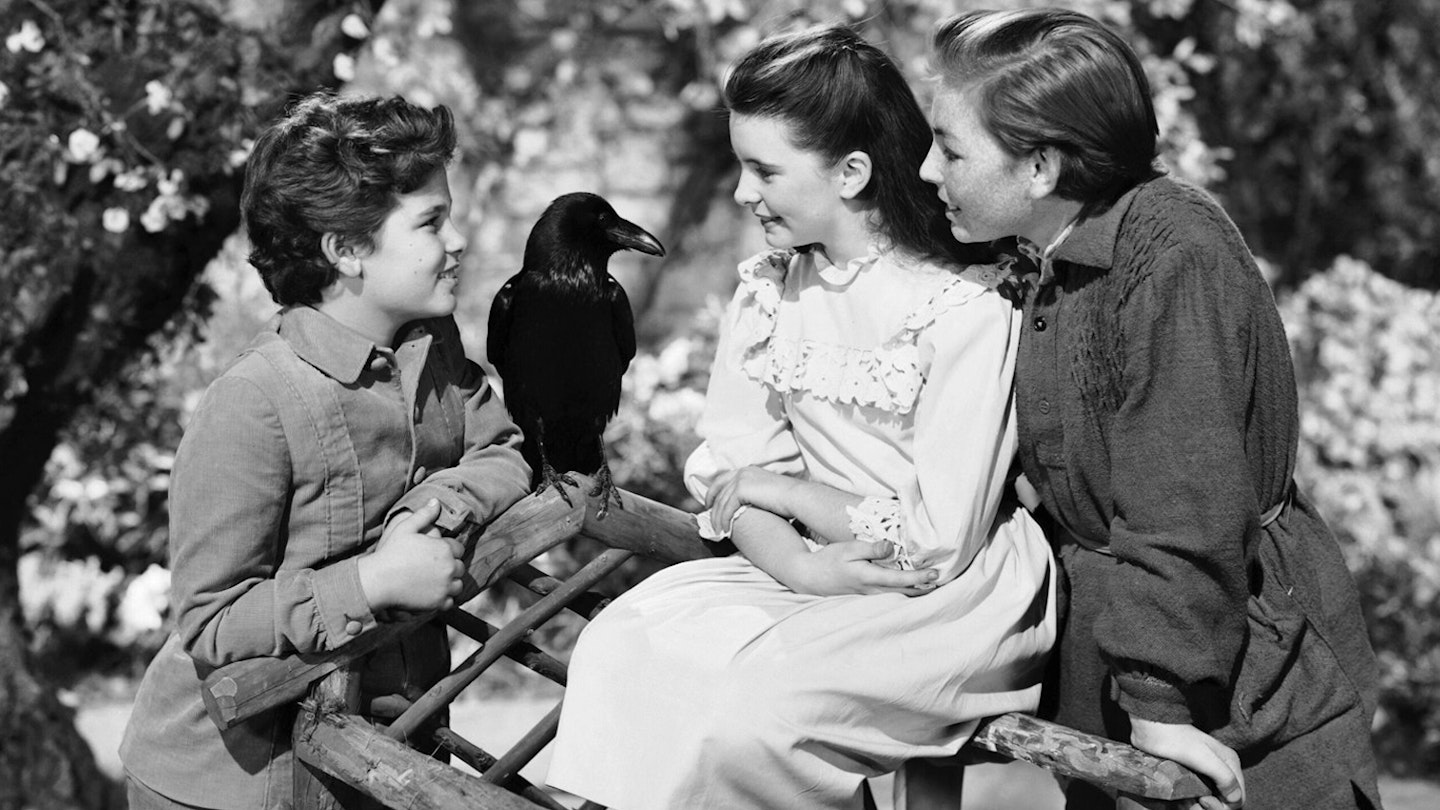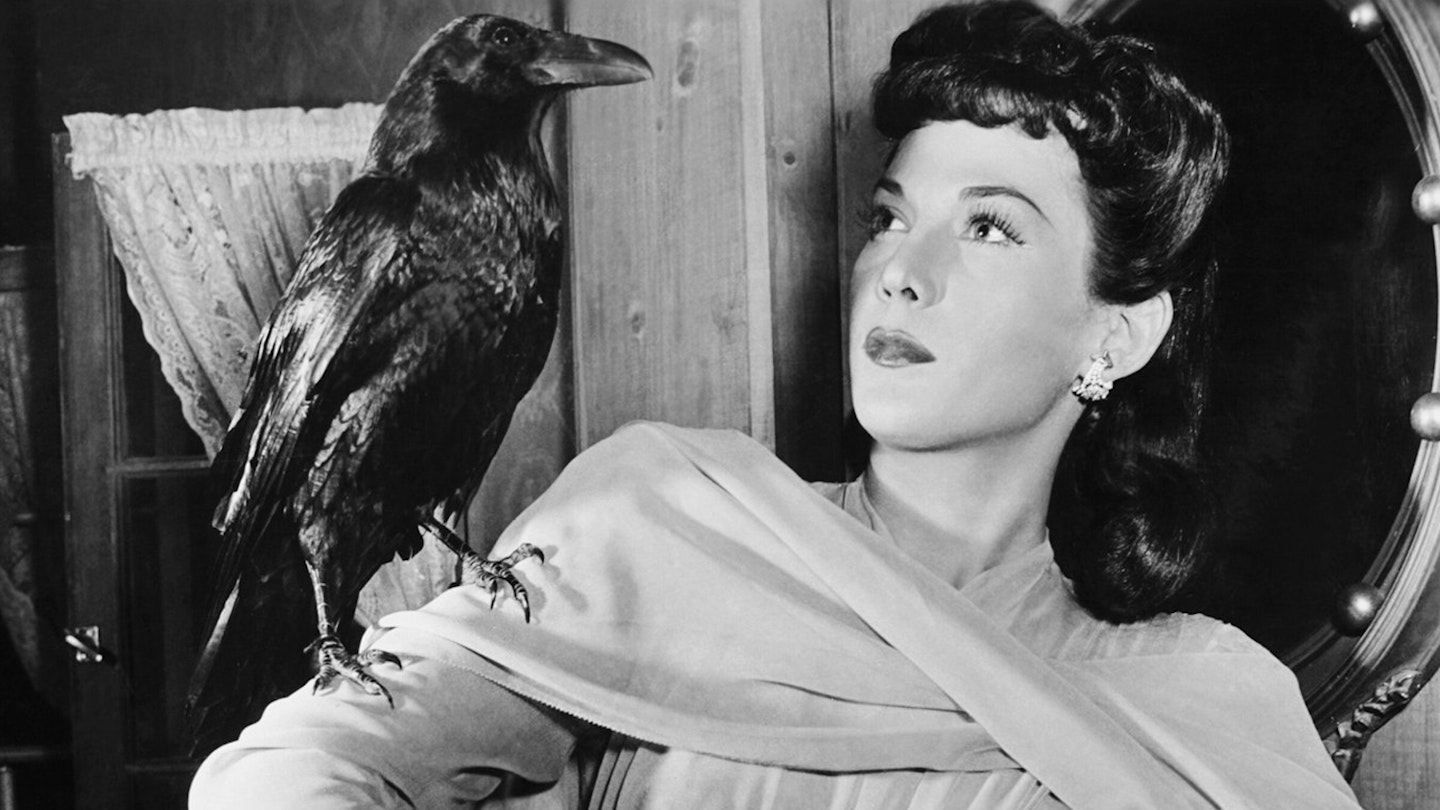Stars can be found in the unlikeliest of places. Marilyn Monroe was noticed at a munitions factory and Haley Joel Osment was scouted in Ikea, but the 20th century’s most prolific actor was discovered on a cactus.
In the mid-1930s, ex-cowboy Henry Wagstaff Twiford was walking across the red rust of the Mojave desert when he stumbled upon a baby raven in an abandoned nest. He took him home, named him Jimmy, and reared him on boiled eggs, eggshells, and milk. Over the course of the next two decades, Jimmy became a star that needed no surname, billed alongside Bette Davis and Judy Garland during Hollywood’s Golden Age. Before he died, the raven was said to have appeared in more than 1,000 films.
That is the extent of what most people know about Jimmy — if they’ve heard of him at all. Despite his vast back catalogue, no biopic has ever been made about Jimmy’s life, and his passing was not marked by a single obituary. Who was this feathered thespian? Was he, as some contemporary accounts suggest, a supercilious virtuoso with a roster of unreasonable demands? Or was he in fact simply mischievous, misrepresented — and even misgendered?
Henry Wagstaff Twiford was better known as ‘Curly’ thanks to his mane of tousled hair. A former cowboy and a wounded World War I veteran, Curly ran a gasoline station near Hollywood between the wars. Bored when business was slow, he began training his dog Squeezit to carry parakeets on a stick. One legend has it that a movie executive stopped at the station to fill his tank and, enamoured by the critters, hired Curly to train a squirrel to do a stunt. Less than a decade later, Curly was an in-demand animal trainer capable of getting a lion to lie down next to a baby, but Jimmy the raven was always top dog.
Curly said it took him a year-and-a-half to train the bird to “do anything an eight-year-old kid can”. Jimmy could type out his own name on a typewriter, pick flowers, open a zipper, unlock a padlock, turn magazine pages, and deal a hand of poker. Arguably, he could do more than most eight-year-olds, as he was also able to light a cigarette, fly backwards and ride upon a miniature motorcycle.

The avian auteur made his Hollywood debut in Frank Capra’s 1938 romcom You Can’t Take It With You, about a rich man who falls in love with a woman from a family of eccentrics (hence their pet raven). Jimmy was filmed helping to manufacture illegal fireworks and letting out the occasional “caw”. Co-star Jimmy Stewart described him as “the smartest actor on the set”, adding that, “They don’t have to make as many re-takes for him as for the rest of us.” Perhaps because of this, Capra became a big fan of the bird — he began offering Jimmy a role in most of his movies, even writing the raven into the script of the 1946 Christmas classic It’s A Wonderful Life. “Capra don’t want no inexperienced boids in the pictures,” Curly succinctly said. By the 1940s, studios were allegedly paying Jimmy $500 a week for his services, and Twiford netted another $200 on top. Adjusted for inflation, this $700 weekly fee would be worth almost $9,000 (£7,400) today. Still, fortune was hardly the most remarkable thing Jimmy found during the war. While the bird’s bank balance grew, so did his brain. By 1948, Jimmy could talk.
Finding a voice
“Smart raven pecks out a living on typewriter,” read a May 1939 newspaper headline about Jimmy’s skills. The light column referred to Jimmy (then ‘Jim’) as a “feathered Einstein” and marvelled at his ability to type with his beak. Yet the report ended with solemn words. Curly, it claimed, “insist[ed] that a raven cannot be taught to speak”.
Nine years later in 1948, Lloyds of London wrote an insurance policy for Jimmy, protecting against a “loss of memory”. At the time, Curly claimed that Jimmy knew “53 usable words” (plus, he joked, a fair few unusable ones). The trainer argued that, “If he ever forgets them, I’m out $700 a week.”
Could Jimmy actually speak at length? Curly claimed the bird knew over 50 words.
Although they don’t have vocal cords, ravens can mimic human speech. A two-pronged organ known as a syrinx sits at the bottom of their windpipe — its vibrating walls allow birds to produce sound. On YouTube, you can watch one raven ask, “What’s up now?” and another say, “Hello, Terry” (to himself, because his name is Terry). Curly claimed that it took roughly a week to teach Jimmy a one-syllable word, and a fortnight of training was required for two-syllable offerings. In March 1941, papers reported that Jimmy would have a five-word line in the screwball comedy The Bride Came C.O.D. — but by the time the film was released in July, no such line appeared in its final cut.
Could Jimmy actually speak at length? A year before Curly claimed the bird knew over 50 words, producer and director Irwin Allen claimed Jimmy had “a vocabulary limited to just one coarsely muttered word — ‘caw’.”
While it’s unclear whether Jimmy had the gift of the gab, it’s abundantly clear that Curly did. In 1941 he claimed Jimmy had appeared in 200 films and a year later, he said that it was 600. By 1950, the “1,000 films” claim was cemented in print. On IMDb, Jimmy is credited in just 28 films — although many of his known credits are missing, such as 1938’s Spawn Of The North, 1939’s Tower Of London, 1946’s Courage Of Lassie and 1947’s The Red Stallion. Whatever the exact truth, Curly clearly knew what to say to get reporters to listen. Eight years before he claimed to have found Jimmy in an abandoned nest, he told a much less exciting story about studying ravens from a pit mine before deciding to train them. In fact, Jimmy’s origin story sounds a lot like that of Curly’s pet dog Squeezit, who he claimed he’d found “starving” in an abandoned building “with a brood of half-dead puppies”.
Meanwhile, the trainer was also fond of claiming that Jimmy would live to be 150 years old, despite the fact that most wild ravens die between the ages of 10 and 15. While birds in captivity can live longer, the oldest raven at the Tower Of London died at 44.
Curly may have liked to spin a yarn, but most of Jimmy’s abilities were caught on camera. When filming 1942’s True To The Army, Jimmy was able to not only pick a card but also hide it under his wing. In 1944’s Gypsy Wildcat, Jimmy can be seen handing out playing cards in his role as a fortune-telling bird. In 1939’s The Wizard Of Oz — perhaps Jimmy’s most famous role — he lands on Ray Bolger’s Scarecrow, caws on command and picks hay out of Bolger’s costume before flying off.

Photos from newspapers also show Jimmy combing Curly’s hair and putting a cigarette in his mouth. Just like his owner, Jimmy knew how to impress reporters — he’d take a handkerchief out of one’s pocket before hiding a five-cent piece in the cuff of the human’s pants. Most remarkably of all, Jimmy even found Curly a wife. In the midst of World War II, a mother and daughter came into the pair’s railway carriage when they were on their way to set. Jimmy landed on the shoulder of the daughter and Curly promptly apologised, sparking a romance that resulted in marriage.
Jimmy didn’t just perform tricks, though — he really acted. Actor Buddy Mason was impressed by the bird’s skills, noting that, “If Jimmy swipes a key from a villain’s pocket… he’ll cock his head to one side, displaying the key to the camera, and appear to be thoroughly elated with what he has done.” Other birds, Mason said, couldn’t compare.
Feathers fly
Many celebrities pretend to be down to earth, but Jimmy was never afraid to fly high. By the time he was filming 1941’s The Bride Came C.O.D., he had already become somewhat of a diva, refusing to continue a scene until he got six “gobbets” of meat, instead of his usual three.
Like all stars, Jimmy also required a stand-in — a substitute on hand for the boring or dangerous work. The most regular bird for the job was Koko (sometimes styled Coco), who was said to take Jimmy’s more “tiresome scenes”, as well as any risky ones. In The Bride Came C.O.D., Koko was involved in five mock explosions while Jimmy watched from the sidelines, nibbling on apples. Koko commanded just $75 a week. He was also struck by a conjunctivitis-like condition in 1938, ‘Klieg eyes’, which was caused by exposure to excess light on the set of the crime thriller Arrest Bulldog Drummond. (This film is another one missing from Jimmy’s IMDb.) Koko’s normally ink-black eyes turned green and he had to be treated with boric acid.
Despite Koko’s difficulties, Jimmy was known to be jealous of the bird, growing contemptuous when he had to wait in the wings. In 1939, Jimmy flew up to the corner of the Tower Of London sound stage and refused to come down after watching Koko in rehearsals. He only relented when his rival was locked away in a cage. Koko wasn’t the only co-star that Jimmy quarrelled with. The bird was ostensibly “supercilious” on the set of 1949’s The Secret Garden, believing himself to be superior to co-stars Baa the lamb, Captain the fox and Rascal the squirrel. Indeed, these actors would often gorge themselves with warm milk and raw meat on set, leaving director Fred M. Wilcox fearful of continuity errors as they grew in size. Captain and Rascal were known to fight for the same tree, but Jimmy would croak at Captain to settle him down.

Actor Jerry Colonna also fell out with Jimmy on the set of 1942’s True To The Army, as he got tired of carrying the bird around on his elbow and considered him “careless”. Though there’s no indication they didn’t get on, Jimmy Stewart had to start going by ‘J.S.’ on the set of It’s A Wonderful Life because the raven would fly in front of the camera whenever the name ‘Jimmy’ was called.
Jimmy was in fact particularly fond of antagonising his human co-workers. The raven nibbled at the yarn in Wilcox’s socks and was regularly witnessed trying to steal food from the lunchboxes of workmen. Jimmy was even known to mock his fellow actors by imitating them. Curly once called him “a great egotist”.
In his downtime, he allegedly enjoyed operating gum dispensers and burying bright objects in the ground. Instead of investing in an Aston Martin, Jimmy’s preferred mode of transport was riding around on the back of a Boston bulldog. Jimmy was also “money mad” — Curly often witnessed him picking up stray coins and saving them for later by swallowing them. The raven opened his own savings account with the Hollywood Building And Loan Association in April 1940, releasing a dime in a deposit box. Jimmy’s growing bank balance meant that he would regularly receive letters begging for money, with most people telling him their sob stories and others asking him to invest in oil wells.
While Jimmy’s death remains mysterious, so do many aspects of his life.
Despite his sometimes curmudgeonly behaviour on set, Jimmy was known to be charitable in private. During the war, the raven regularly visited wounded soldiers in hospital, and spent a total of 200 hours entertaining them with his tricks. In 1947, the American Red Cross awarded him a medal in recognition for his services.
The family business
Jimmy the raven does not have a star on the Hollywood Walk Of Fame, but by 1949 his talon prints had been immortalised in cement and displayed in a pet shop nearby. In April 1956, his owner Curly passed away aged 60. Not much is known about what happened to Jimmy, whose last film appears to have been 1954’s comedy 3 Ring Circus, in which he has a caw-ing conversation with Dean Martin, before using three caws to tell him (off camera, in what sounds very, very much like a dub), “You’re in love.”
While Jimmy’s death remains mysterious, so do many aspects of his life. In 1941, one newspaper report claimed that Jimmy was in fact a female raven, and was regularly misgendered because she was “cast in roles in which the male characteristics of aggressiveness and courage were dominant”. The articles also claimed that Jimmy was “in the throes of a torrid love affair with Coco, her stand-in”.
In subsequent reports, Jimmy went back to being described with “he” and “him” pronouns, but this is another hint that when it came to the raven, the truth was as free as a bird. Regardless of his or her gender, Jimmy may possibly have been a parent. Animal trainer Moe DiSesso claimed that, “In 1944, I was given two raven eggs by a friend” — he placed them under a hen to hatch and one became ‘Jim Jr’. Reports differ as to whether Curly gave Moe the eggs — it is more likely that Jim Jr was simply named after the great bird.
Either way, Jim Jr went on to become a movie star in his own right — by 1961, he had starred in over 30 films, and was able to grab cigarettes, croak on cue, and even load a gun. Jim Jr was a veteran of TV — he can be seen in the 1950s shows The Cisco Kid and I Married Joan, as well as ’60s sitcom Bewitched. In 1957, a raven named Jimmy — it’s unclear which — was witnessed demanding sugar on his meat on a set. “Sugar! Sugar!” yelled the bird as he was served his dinner on a “raven-sized banquet table”. Like father, like son? Curly, at least, most definitely was a father — his son, 70-something- year-old Greg Twiford, is now head of an animal trainers’ association and spent the summer walking the picket line in support of the actors’ and writers’ strikes. A placard he carried read, “Animal actors are starving.”
When he was alive, newspapers called Jimmy “one of the hottest actors in pictures” who “has stolen every movie scene in which he has ever appeared”. Curly’s wife once described the trainer with the words, “Even bees won’t bite the guy.” Together, this unique pairing made movie history — and both live on in classics that are still watched regularly today. It’s an undeniable legacy. Quoth the raven: forevermore.
Originally published in the December 2023 issue of Empire
